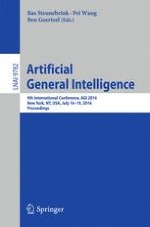2016 | OriginalPaper | Buchkapitel
Why Artificial Intelligence Needs a Task Theory
And What It Might Look Like
verfasst von : Kristinn R. Thórisson, Jordi Bieger, Thröstur Thorarensen, Jóna S. Sigurðardóttir, Bas R. Steunebrink
Erschienen in: Artificial General Intelligence
Aktivieren Sie unsere intelligente Suche, um passende Fachinhalte oder Patente zu finden.
Wählen Sie Textabschnitte aus um mit Künstlicher Intelligenz passenden Patente zu finden. powered by
Markieren Sie Textabschnitte, um KI-gestützt weitere passende Inhalte zu finden. powered by
